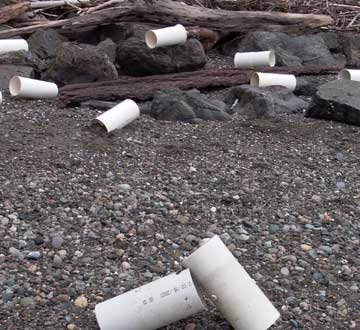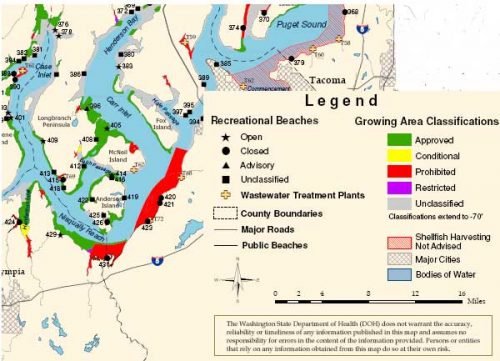[et_pb_text admin_label="Chris Fitzgerald byline; remember to tag post as various-contributors" saved_tabs="all" background_layout="light" text_orientation="left" header_font="Arimo||||" text_font="||on||" use_border_color="off" border_color="#ffffff" border_style="solid"]
The battle for acceptable compromise between the commercial geoduck industry and environmental groups began on a small, local scale last spring. Today, less than a year later, controversy over growing methods, and lack of adequate scientific study to provide a solid ecological footing for this relatively new aquaculture has reached beyond interim regulations sought by Pierce County.
 Remnants of a geoduck farming operation are seen at Joemma Beach State Park about a month after December’s storm. Geoduck farms officials have said they clean up the beaches around their farms on a weekly basis. Photo by Chris Fitzgerald
Remnants of a geoduck farming operation are seen at Joemma Beach State Park about a month after December’s storm. Geoduck farms officials have said they clean up the beaches around their farms on a weekly basis. Photo by Chris Fitzgerald
Rep. Pat Lantz of the 26th Legislative District introduced House Bill 1547, “Examining Geoduck Aquaculture Techniques and Practices,” on Jan. 19. It proposes to amend existing shellfish regulations in Puget Sound (RCW 79.135.110), calling for a minimum of eight specific studies through the sea grant program at the University of Washington, with full disclosure by proposed researchers “of past, present, and planned future personal or professional connections with the shellfish industry or public interest groups.”
Among the mandated studies are an assessment to determine how “high densities” of geoduck in previously wild tracts alter species diversity, and the potential for cultured stock to put wild stock at risk. Lantz’s bill asks for science to study the capacity of intertidal lands to carry the large-scale monoculture farms the industry intends to implement. The legislation also carries a mandate for growers to post a bond equal to the cost of cleanup, as opposed to the Department of Natural Resources proposal of twice the amount of the lease on state lands, an amount averaging $1,000 per year per leased site, at most.
The bill calls for all studies to be completed and findings reported to the Legislature by 2013, with annual updates on study progress in the interim. Most importantly, the bill places a moratorium on state tideland leases. It reads: “Except for contracts that have had a request for offer issued prior to the effective date of this section, the department is prohibited from entering into any leases that would permit the commercial aquaculture of geoducks on state-owned aquatic lands associated with Puget Sound, including the Strait of Juan de Fuca, until one full calendar year after the sea grant program at the University of Washington reports to the Legislature the results of the studies required by section 1 of this act.”
 Map courtesy Washington State Department of Health
Map courtesy Washington State Department of Health
The bill further calls for each new proposed lease (public and private) to obtain a conditional use permit from the Department of Ecology; it requires additional restrictions on setbacks, buffers, and habitat for state and federal endangered species. Included is also a provision for permit revocation for geoduck operations out of compliance. The bill first goes to the House Puget Sound Committee for hearings, and must secure funding from the Appropriations Committee.
Lantz says the bill addresses the issue of compliance, county by county, and provides a minimum standard — a site-specific conditional use permit from DOE for each new lease. “The (shellfish) industry’s intention was to obtain one (blanket) permit to grow geoduck anywhere; (armed with that), they would not be subject to scrutiny,” she said, adding that Mason County, for instance, has no permit requirements at this time.
“This bill is an attempt to give counties the opportunity to use the minimum application-by-application, site-by-site specific standard, and impose their own regulations in addition,” she said. The bill, if passed, will supersede DNR’s plan to lease 25 acres of public tidelands per year for the remaining nine years of the proposed 10-year leasing cycle. “We can tell DNR what they can do with public lands,” Lantz said. “We can’t tell private landowners what they can do, but we can regulate them.”
Last fall, the shellfish industry’s Pacific Shellfish Institute released its “West Coast Shellfish Research and Education 2015 Goals and Priorities” and “Geoduck Clam Research and Management” documents. They acknowledge that “increasingly, the general population is demanding that forests, riparian areas, beaches and other wildlife habitats be preserved and enhanced.” The research document states that cultured shellfish are an integral part of the marine ecosystem, and addresses industry debris issues with this solution: “Expand participation with marine-focused organizations (such as tribes, environmental groups, marine resource committees) in beach cleanups throughout Puget Sound, most notably to retrieve and recycle or properly dispose of all derelict or lost shellfish aquaculture equipment and materials.” PSI’s report also calls for research, specifically “integrated pest management” of such species as red rock crab, Dungeness crab, diving ducks, gull, and crows, among others.
Just as Lantz’s bill, this report is concerned with “optimal densities for beach seeding... in regard to sustaining production and beach condition (particularly in… geoduck).” The document goes on to say that with potential regulatory control of geoduck seeding, the density issue could “move to a higher priority as the geoduck grow-out industry develops.” The report concludes that, “It is possible for Washington growers to make rapid advancements in subtidal geoduck culture… Washington growers possess the infrastructure to begin… (and) geoduck seed supply is not limited…”
HB-1547, responds to the message among diverse environmental groups at local, regional and national levels. In an email to the Henderson Bay Shoreline Association, Becky Goldburg, a representative of the nationally-known Environmental Defense Council, writes, “…There are legitimate issues about where mollusk farms are sited, how big they should be and how farming activities are conducted.” People for Puget Sound, a Seattle-based organization, issued an “Intertidal Geoduck Policy,” which advocates regulation of geoduck aquaculture, and “open space taxation programs that provide financial incentives to private tideland owners for leaving their tidelands in a natural state.” The Washington Council of Trout Unlimited passed Council Resolution 06-1 in November, saying, “…The state Department of Natural resources has declined to perform a Programmatic Environmental Impact Study to determine the long-term effects of (geoduck farming) activity, declaring it unnecessary. The agency instead intends, through adaptive management, to correct any harm observed only after it has been discovered. The scientific research to determine the long-term impacts of such activity is lacking and no formal peer reviewed studies have been completed. While there have been limited studies conducted by the (shellfish) industry and some informal investigation by academicians… the exact long-term impact on the sensitive Puget Sound near-shore environment is unknown.”
According to Lantz, her intention in crafting HB-1547 is to provide clear pathways for responsible aquaculture. The positions of nearly every organization concerned about the rapid, unfettered growth of this young aquaculture is echoed in the Trout Unlimited document where it reads: “Aquaculture management within Washington state is diffused among at least five separate agencies, along with federal and tribal agencies, that are subject to management procedures, processes and rules that are often conflicting and confusing to agency managers, the industry, and the general public. This diffused system of aquaculture management has contributed to the uncertainty and confusion in permitting and leasing for near-shore geoduck activities and, in this instance, has hi-lighted the need for a more comprehensive, efficient and centralized management system.”
Update on permits
Two geoduck farming application permits on private tidelands, initiated by Taylor Shellfish Farms in the Vaughn Bay area (SD55-05 and SD53-05), were approved and on appeal, as reported in the January KP News. On Jan. 19, they were reconsidered by Terrence McCarthy, Pierce County deputy hearing examiner. He upheld the standard 8:30 a.m. to 4:30 p.m. Monday through Friday, with no working holidays, operation for harvesting. The company had sought the ability to harvest at night, using lights and operating equipment.
McCarthy wrote, “Waking up individuals at all times of the night… intensifies a built-in conflict… time limitations are used to minimize conflicts between two incompatible uses, that of noisy commercial farming, and the quiet residential life in the rural area.”
He denied two permit conditions the county sought: a final site plan, and yearly compliance status reports. McCarthy dismissed Taylor Shellfish’s statement that he did not have “authority to review” operations and extended that review period from three to five years.[/box]
HB-1547 information
To read the text of House Bill 1547, and follow its progress through the legislative system, go to Rep. Pat Lantz’s Website at http://hdc.leg.wa.gov/members/lantz. At press time, public hearings were expected during the first week of February.
Contact Rep. Lantz: 438A Legislative Bldg. PO Box 40600 Olympia, WA 98504-0600 (360) 786-7964 lantz.patricia@leg.wa.gov[/box]
UNDERWRITTEN BY THE FUND FOR NONPROFIT NEWS (NEWSMATCH) AT THE MIAMI FOUNDATION, THE ANGEL GUILD, ADVERTISERS, DONORS AND PEOPLE WHO SUPPORT INDEPENDENT, NONPROFIT LOCAL NEWS